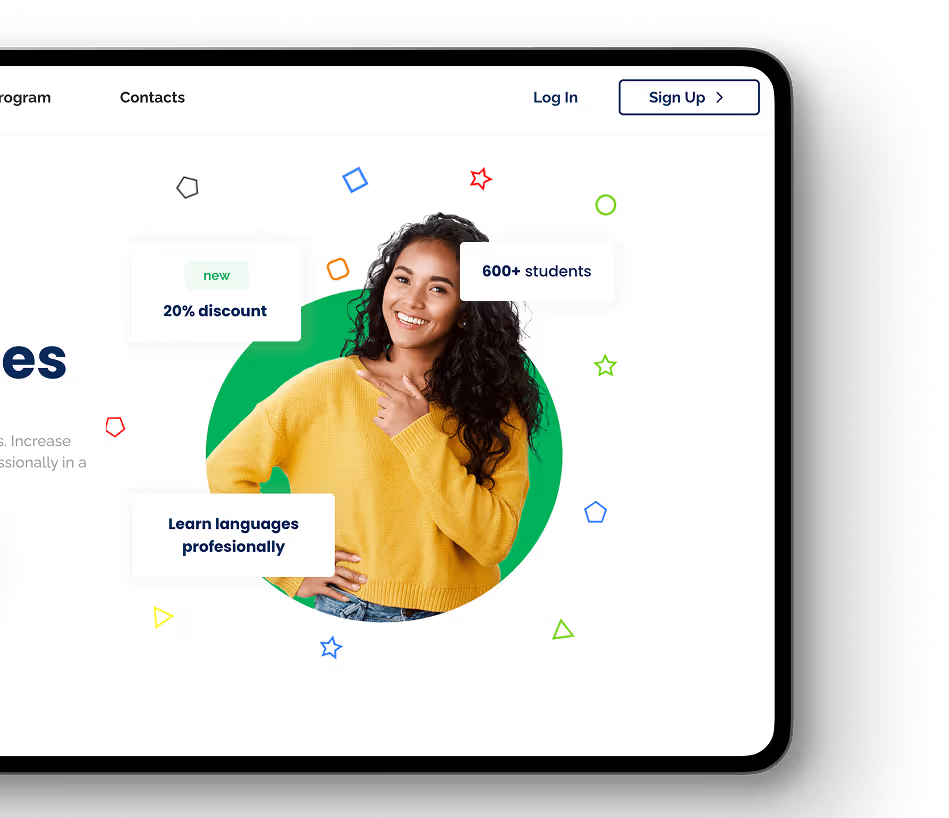February 29, 2024
•
10
min read
A Comprehensive Guide to Custom CRM Solutions
Empower your business with custom CRM solutions, tailored to enhance customer relationships and drive growth.

Customer Relationship Management (CRM) is a technology-driven approach used by businesses to manage and analyze customer interactions and data throughout the customer lifecycle.
It aims to improve business relationships with customers, assist in customer retention, and drive sales growth.
CRM systems compile customer data across different channels, or points of contact, between the customer and the company, which could include the company’s website, telephone, live chat, direct mail, marketing materials, and social media.
CRM solutions provide businesses with insights into their customer base, managing leads, facilitating team communication, and improving customer service.
Tailored custom CRM apps are pivotal for businesses that have unique operational flows, customer handling methodologies, or specialized products and services. A one-size-fits-all CRM system may not encompass all the specific needs or processes of every organization.
Custom CRM software allows businesses to prioritize features that are essential to their operations, thereby enhancing user adoption and productivity.
Furthermore, they enable better alignment with the company's business objectives and customer service policies, leading to improved customer satisfaction, loyalty, and ultimately, increased profitability.
Customizing a CRM platform ensures that it fits perfectly with the unique challenges and opportunities of the business, allowing for a more strategic approach to customer relationship management. Sales reps and other workers will be able to rely on the company's own CRM system and take things to the next level!
Understanding Your Business Needs
Before you start with your own custom CRM development that perfectly aligns with your company's goals, it's critical to understand your specific business needs thoroughly.
This understanding begins with a comprehensive evaluation of your existing processes and practices to ensure the custom CRM system enhances and streamlines operations instead of complicating them.
Assessing Current Processes
Start by mapping out all your current workflows, including how your team communicates with customers, manages data, and tracks sales lead progress.
This assessment will help you pinpoint inefficiencies and areas where automation or better integration could significantly impact productivity and customer satisfaction.
Identifying Pain Points
After assessing your current processes, focus on identifying the major challenges or 'pain points' your team faces. These might include data silos that prevent a unified view of customer information, time-consuming manual tasks, or difficulties in tracking customer engagement.
Recognizing these issues is crucial for developing a CRM solution that addresses these specific challenges effectively.
Defining Key Objectives
With a clear understanding of your current processes and pain points, the next step involves setting defined objectives for what you want your custom CRM to achieve.
Whether it's improving customer service, increasing sales, or enhancing team collaboration, having clear, measurable goals will guide the selection of features and functionalities for your custom CRM system, ensuring it delivers meaningful results.
Advantages of Custom CRM Solutions
Custom Customer Relationship Management (CRM) solutions offer a myriad of benefits tailored to meet the specific needs of businesses.
When you rely on custom tables and specific CRM data, you can make sure that the sales team and other workers are coming up with the best strategies to ensure that your customers are satisfied.
These advantages are not only pivotal for optimizing operations but also for nurturing long-term customer relationships. Below are key benefits that custom CRMs bring to the table:
Increased Efficiency
Custom CRM systems are designed with a business's unique processes and workflow in mind, leading to increased operational efficiency.
Automating routine tasks, integrating with existing software, and providing relevant data insights, these solutions streamline operations, saving time and resources. This efficiency boost allows teams to focus more on strategic activities rather than being bogged down by administrative tasks.
Enhanced Customer Experience
Tailoring the CRM to the specific needs and behaviors of a business's customer base allows companies to offer personalized experiences that significantly enhance customer satisfaction.
Custom CRMs can segment customers more effectively, tailor communication, and proactively address customer needs, building stronger relationships and increasing loyalty.
Scalability and Flexibility
Unlike off-the-shelf CRM systems, custom solutions can grow and adapt to a business. They are built to be scalable, accommodating increased loads, additional functionalities, or changing business processes without substantial overhauls.
This flexibility ensures that businesses are not constrained by their technology but rather enabled by it to explore new opportunities and adapt to market changes.
Key Features of Custom CRM Solutions
Custom CRM (Customer Relationship Management) solutions stand out due to their adaptability to specific business processes and needs. Below, we explore some of the key features that make these platforms indispensable for businesses aiming for growth and enhanced customer relationships.
Tailored Data Fields
Custom CRMs allow for the creation of tailored data fields that match the unique needs of a business. This means that, unlike one-size-fits-all solutions, a custom CRM can capture and store information that is specific to the operation and management of a particular business. This leads to more relevant data collection, improving the quality of customer interaction and service.
Automation Capabilities
These systems can automate repetitive tasks, such as sending out follow-up emails or updating sales records, increasing efficiency and allowing sales teams to focus more on creating meaningful customer relationships.
Automation also ensures that no part of the customer interaction process is overlooked, improving overall customer experience.
Integration with Existing Systems
A major advantage of custom CRM solutions is their ability to seamlessly integrate with existing business systems, such as ERP (Enterprise Resource Planning), marketing automation tools, or email platforms.
This integration ensures that data flows freely between systems, providing a unified view of customer information and interactions across the organization.
Advanced Analytics
Custom CRM solutions come equipped with advanced analytics features, offering deep insights into customer behavior, sales trends, and marketing campaign effectiveness.
These insights not only inform strategic decision-making but also enable businesses to anticipate customer needs, personalize interactions, and identify new market opportunities.
Types of Custom CRM Solutions
Custom Customer Relationship Management (CRM) solutions offer businesses tailored approaches to managing their customer interactions, data, and processes. These solutions can be broadly categorized into three primary types, each with its unique set of advantages and deployment considerations.
Cloud-Based Options
Cloud-based CRM solutions are hosted on the provider's servers and accessed via the Internet. This model offers the flexibility of remote access from anywhere, at any time, making it a popular option for businesses with a dispersed workforce or those seeking scalability and ease of integration with other cloud services.
It usually comes with regular updates and lower upfront costs since it often operates on a subscription model.
On-Premises Solutions
On-premises CRM systems are installed and run on a company's own servers, giving businesses full control over their data and the security of their CRM environment.
This type might appeal to companies with strict data control regulations or those with the in-house IT infrastructure and capabilities to manage their systems. It typically requires a higher initial investment but can offer cost savings in the long term.
Hybrid Approaches
Hybrid CRM solutions combine elements of both cloud-based and on-premises systems, offering flexibility and control where needed. This approach allows companies to store sensitive data on their own servers for enhanced security while leveraging the cloud for less critical functions.
It's suitable for organizations looking for a balance between the scalability and accessibility of cloud services and the security and control of on-premises solutions.
Selecting the Right CRM Vendor
Selecting the right Customer Relationship Management (CRM) vendor is a crucial step in implementing a system that aligns with your business’s unique needs.
When navigating through the plethora of options available in the market, there are a few key areas you should focus on to ensure your chosen CRM enhances your customer relationships and, ultimately, your business’s success.
Researching Vendor Reputation
Start by researching the reputation of potential CRM vendors. Understand the history of the vendor, the range of industries they serve, and their track record for stability and innovation.
A reputable vendor should have a proven history of delivering reliable service and adapting to changes in technology and business processes.
Evaluating Customer Reviews
Customer reviews can provide invaluable insights into the user experience, including ease of use, performance, and the level of customer service provided by the vendor.
Look for reviews from businesses similar to yours in size and industry to get a sense of how well the CRM may meet your specific needs.
Customization Options and Support
Finally, evaluate the customization options and support available. A CRM solution should be flexible enough to tailor its features, workflows, and interfaces to fit your business processes.
Additionally, ensure that the vendor offers comprehensive support and training resources to facilitate a smooth implementation and ongoing use.
Planning the Implementation Process
When undertaking the task of implementing a custom CRM solution, careful consideration and strategic planning are paramount. This process can significantly impact your business's operational efficiency and customer relationships. Below are key components to focus on:
Setting Realistic Timelines
Establishing realistic timelines is crucial to ensure a smooth transition to the new CRM system. Take into account the complexities of the custom features you are integrating, the scale of data migration, and the capacity of your team.
Setting achievable deadlines, with allowance for unforeseen challenges, ensures that the project progresses methodically and stress is minimized.
Training and Change Management
The success of a new CRM system heavily relies on the users' ability to effectively utilize it. Implement comprehensive training programs that cater to various user proficiency levels.
Also, employ change management strategies to address resistance and foster a culture of adaptation and continuous improvement.
Data Migration Strategies
Migrating data to a new CRM system is a critical step that requires meticulous planning. Prioritize data integrity and security by conducting thorough audits of the current data, establishing a clear mapping strategy, and performing test migrations.
This approach reduces the risk of data loss or corruption and ensures a smooth transition to the new platform.
Overcoming Common Implementation Challenges
Implementing a custom CRM solution can be a complex process filled with various challenges. Here are strategies to overcome some of the most common issues:
Resistance to Change
Change can often be met with resistance from employees who are comfortable with existing processes. To mitigate this, it's crucial to communicate the benefits of the new CRM system clearly and involve key stakeholders early in the planning process. Recognizing and rewarding contributions through tools like employee recognition software can help build enthusiasm for the new system, making employees feel valued and more open to embracing change.
Providing comprehensive training and support can also ease the transition, helping staff to adapt more quickly and positively to the new system.
Data Security Concerns
With the increasing emphasis on data collection, privacy and protection, security concerns are paramount when implementing a new CRM system.
Ensuring the chosen CRM has robust security features, including data encryption and secure access controls, is essential. Additionally, educating users on the importance of data security and best practices can help in addressing these concerns effectively.
User Adoption Strategies
Maximizing user adoption is critical to the success of any new CRM system. Employing strategies like customization of the CRM to meet specific user needs, regular training sessions, and providing a clear roadmap of the benefits can significantly enhance user adoption rates.
Incorporating feedback mechanisms where users can share their inputs and concerns about the CRM system also fosters a sense of ownership and encourages more active use.
Measuring ROI and Success Metrics
To assess the effectiveness of a custom CRM solution, it's essential to measure return on investment (ROI) and monitor key success metrics. This process involves several critical steps:
Defining Key Performance Indicators (KPIs)
Identifying the right Key Performance Indicators (KPIs) is foundational to measuring the success of a custom CRM.
These indicators might include metrics related to sales growth, customer retention rates, lead conversion rates, and customer satisfaction levels. Aligning KPIs with your business objectives allows you to create a focused and effective measurement strategy.
Regular Monitoring and Evaluation
Once KPIs are defined, the next step involves setting up a system for regular monitoring and evaluation. This allows businesses to track progress over time and identify trends.
Using dashboards and reporting tools within the CRM can provide real-time data and insights, making it easier to understand how the CRM is impacting the business.
Adjusting the CRM Strategy
The data gathered from monitoring KPIs should not only serve as a measure of success but also as a guide for continuous improvement. When they regularly evaluate this information, businesses can identify areas of their CRM strategy that need adjustment.
Whether it's refining customer communication methods, customizing features to better meet user needs, or redefining target segments, making data-driven adjustments ensures the CRM system evolves in line with business growth and changes in the market.
Summary of Custom CRM Best Practices
In conclusion, custom CRM solutions are pivotal for businesses aiming to optimize their customer relationship management in a tailored manner. These systems provide the flexibility and specificity needed to address unique business challenges and goals.
Key Takeaways
- Customization and Flexibility: Custom CRMs can be tailored to meet the exact needs of a business, offering unparalleled flexibility compared to off-the-shelf options.
- Enhanced Customer Experience: By designing a CRM that caters specifically to your business processes, you can provide a superior customer experience, fostering loyalty and retention.
- Scalability: Custom CRM systems are built with growth in mind, ensuring that they can scale alongside your business.
Ready to kickstart your app's development?
Connect with our team to book a free consultation. We’ll discuss your project and provide a custom quote at no cost!
Latest articles
We put the rapid in RapidDev
Ready to get started? Book a call with our team to schedule a free consultation. We’ll discuss your project and provide a custom quote at no cost!









